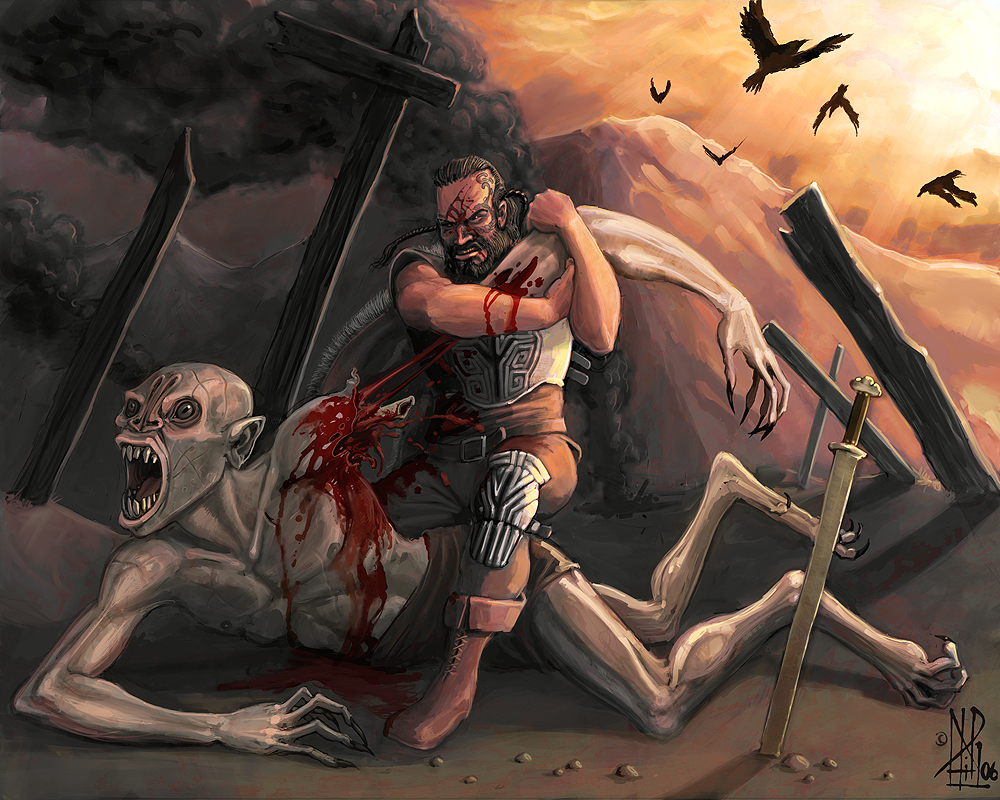Have you read the other versions?
That's a rhetorical question.
Note the difference in tone in the first three lines:
Raffel's Translation
HEAR ME! We've heard of Danish heroes,
Ancient kings and the glory they cut
For themselves, swinging mighty swords!
Kennedy's Translation
Lo! we have listened to many a lay
Of the Spear-Danes' fame, their splendor of old,
Their mighty princes, and martial deeds!
Gummere's Translation
Lo, praise of the Prowess of people-kings
of spear-armed Danes, in days long sped,
we have heard, and what honor the athelings won!
Donaldson's Translation
Yes, we have heard of the glory of the Spear-Danes' kings in
the old days—how the princes of that people did brave deeds.
Heaney's Translation
So. the Spear-Danes in days gone by
and the kings who ruled them had courage and greatness.
We have heard of those princes' heroic campaigns.
Here's a longer passage:
Note how the diction influences the tone and meter of the translations.
Beowulf: an excerpt
Raffel's Translation
285 Out from the marsh, from thefoot of misty
Hills and bogs, bearing God's hatred,
Grendelcame, hoping to kill
Anyone hecould trap on this trip to high Herot.
He moved quickly through thecloudy night,
290 Up from his swampland, sliding silently
Toward that gold-shining hall. He had visited Hrothgar's
Home before, knew the way—
But never, before nor after that night,
Found Herot defended so firmly, his reception
295 So harsh. Hejourneyed, forever joyless,
Straight to the door, then snapped it open,
Toreits iron fasteners with a touch
And rushed angrily over thethreshold.
Hestrode quickly across theinlaid
300 Floor, snarling and fierce: hiseyes
Gleamed in the darkness, burned with a gruesome
Light. Then hestopped, seeing the hall
Crowded with sleeping warriors, stuffed
With rows of young soldiers resting together,
305 And his heart laughted, herelished thesight,
Intended to tear thelifefrom those bodies
By morning: the monster's mind was hot
With thethought of food and thefeasting his belly
Would soon know. But fate, that night, intended
310 Grendel to gnaw the broken bones
Of his last human supper.
Heaney's Translation
710 In off the moors, down through the mist brands,
God-cursed Grendelcame greedily loping.
The bane of therace of men roamed forth,
hunting for a prey in the high hall.
Under thecloud-murk he moved towards it
until it shone above him, a sheer keep
of fortified gold. Nor was that thefirst time
he had scouted the grounds of Hrothgar's dwelling—
although never in his life, before or since,
did hefind harder fortune or hall-defenders.
720 Spurned and joyless, hejourneyed on ahead
and arrived at the bawn. Theiron-braced door
turned on its hinge when his hands touched it.
Then his rage boiled over, heripped open
the mouth of the building, maddening for blood,
pacing thelength of the patterned floor
with his loathsometread, while a baleful light,
flame morethan light, flared from hiseyes.
Hesaw many men in the mansion, sleeping,
a ranked company of kinsmen and warriors
730 quartered together. And his glee was demonic,
picturing the mayhem: before morning
he would rip lifefrom limb and devour them,
feed on their flesh; but his fatethat night
was dueto change, his days of ravening
had come to an end.
Here's a prose version (rather than verse):
Donaldson's Translation
(XI.) Then from the moor under the mist hills Grendel came walking,
wearing God's anger. The foul ravager thought to catch some one of
mankind there in the high hall. Under the clouds he moved until he could
see mostclearly the wine-hall, treasure house of men, shining with gold. That
was not the first time that he had sought Hrothgar's home. Never before or
sincein his life-days did hefind harder luck, hardier hall-thanes. Thecreature
deprived of joy came walking to the hall. Quickly the door gave way, fastened
with fire-forged bands, when he touched it with his hands. Driven by evil
desire, swollen with rage, hetoreit open, the hall's mouth. After that thefoe
at oncestepped onto theshining floor, advanced angrily. From hiseyescame
a light not fair, most like a flame. He saw many men in the hall, a band of
kinsmen all asleep together, a company of war-men. Then his heart laughed:
dreadful monster, he thought that before the day came he would divide the
lifefrom the body ofevery one of them, for there had cometo him a hope of
full-feasting. It was not his fatethat when that night was over heshould feast
on more of mankind.
Check out this passage in twelve different translations, including Heaney's.
ALSO READ THE INTRODUCTION TO THE HEANEY TRANSLATION.
Feel free to cite this blog or the Heaney intro in your essay DUE FRIDAY.
Don't forget your Top 10 post to the Showcase
http://formvistudentshowcase.blogspot.com
Hope you enjoyed your last A-V Day!





